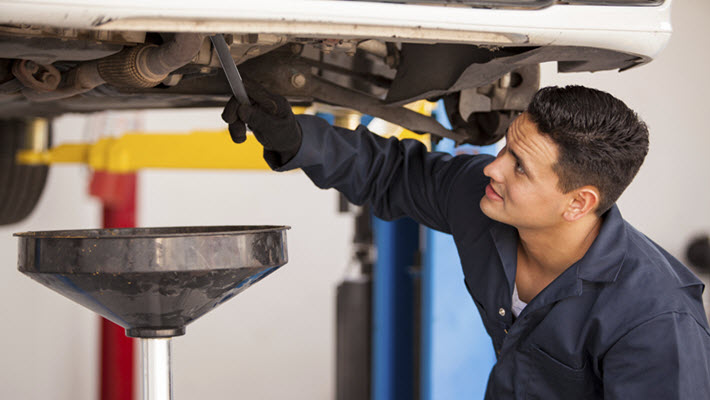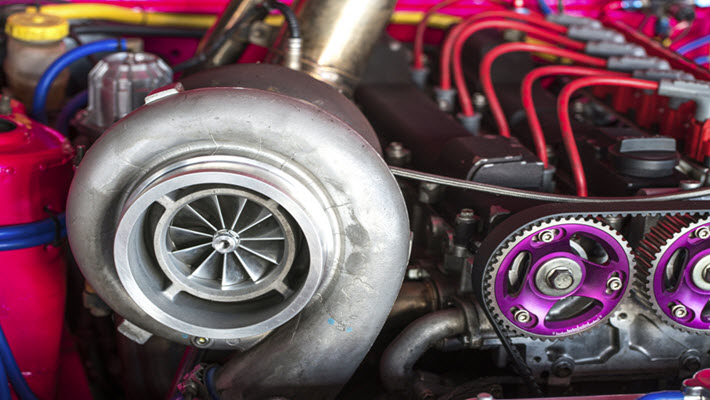Drivers may hear it all the time, “this car comes turbocharged” and unless you’re passionate about cars, you may be unsure what exactly this means. A turbocharger is a stronger turbine-driven forced induction device that will increase a combustion engine’s efficiency and power by forcing extra air into the vehicle’s combustion chamber. Simply put, it maximizes the vehicle’s performance both from efficiency and power standpoints, making them desired vehicles for most car enthusiasts.
With this added performance capability however, turbocharged vehicles have their own completely different set of maintenance requirements to keep them performing properly for years. If you’re thinking of owning a turbocharged vehicle or already do, here are just some of the best tips to help take care of your car and maximize its’ lifespan.
-
- Warm Your Engine Up– Oil must be warmed before it can begin to effectively lubricate the engine, so letting your engine warm up before beginning your trip is a great way to ensure maximum performance. When you first start your vehicle the oil is cold and thick, which will require more oil pressure to pump it through the engine and this will also put extra pressure on oil seals. As it heats up, it thins out and is able to move faster around the engine, which helps it maintain peak efficiency.
- Let it Cool Down– Unless the last few miles of your drive were slower-paced, it’s important to give your turbo a few minutes to cool down before shutting it off completely. Since it performs stronger tasks, there’s a good chance it’s hotter than ideal for completely shutting your engine off. If the oil in your turbo isn’t given time to cool and circulate, it can turn into engine sludge over time which will clog your oil channels and will wear your vehicle’s bearings down faster. Usually even just a minute of idling time after a 20-30 minute drive will help you avoid early turbo failure.
- Use The Gears, Not Always the Turbo– If you can control your gear selection in your vehicle, using lower gears when passing other cars or driving up hills will help take work off of the turbo. Even being just a gear lower will reduce the time you spend using maximum boost pressure. The added strain of constantly using your turbo will reduce the lifespan of it and replacing or repairing your turbocharger is a costly process whether you go to a professional or do it yourself.
- Use Proper Oil– Oil helps to lubricate the moving parts of your turbo and your engine requires constant oil to properly work. Using the proper oil for your vehicle is the easiest way to protect your turbo and extend its’ lifespan. Usually experienced auto mechanics recommend fully synthetic oil and having your oil changed every 5,000 miles as the best ways to prevent oil related issues in your engine but always consult your vehicle’s manual for the recommended oil to use.

- Change Your Air Filter– Simple preventative maintenance shouldn’t get lost in all of the other ways to care for your turbo. Even just changing the air filter is a great way to prevent debris from affecting your turbo’s performance. It’s recommended to change your filters every 10,000 miles to help them remain effective.
- Drive Carefully– This may sound too simple but the faster you accelerate and drive your car, the harder you work the turbo and the more stress you put on your engine. Most turbocharged cars are extensively stress tested to make sure they can withstand heavy driving at high speeds but by no means does that make them immune to issues. While cruising it’s ok to open the throttle up from time to time but other times, going easy on the accelerator and using the minimum amount of force to speed up will take it easier on your turbo and your engine and will help extend the lifespan.
Final words
Owning a turbocharged car is a serious commitment usually made by only the most enthusiastic drivers with the passion required to make sure that it stays running in peak condition with maximum performance efficiency. To those drivers who simply liked the vehicle for another reason who may not as passionate about cars, it’s important to follow the right steps to preserve your turbo and extend its’ lifespan as long as possible.

